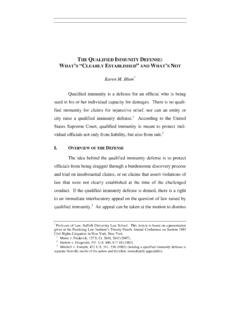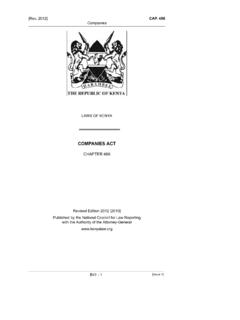Transcription of Six Principles of Scientific Thinking
1 Six Principles of Scientific Thinking There are six Principles of Scientific Thinking encountered repeatedly throughout your textbook, and described in detail on pages 21 to 26 and on the special summary (pull-out) page found between pages 24-25. Questions about them may turn up on any unit test. Therefore we recommend that you study these six Principles for every test. Scientific Thinking Principle #1: Ruling out Rival Hypotheses (p. 22). What do we mean by rival hypotheses ? Why is the ability to rule them out an important part of Thinking scientifically?
2 Scientific Thinking Principle #2: Correlation Isn t Causation (pp. 22-24). What is causation? What is a correlation? Why can t we be sure about the direction of causality (and therefore can t draw causal conclusions) when we have correlational findings? Scientific Thinking Principle #3: Falsifiability (p. 24). What makes a Scientific claim falsifiable? What is the problem if a claim is not falsifiable? Scientific Thinking Principle #4: Replicability (p. 24). Why is replicability, or repeatability, so important in science? What does it tell us if other research has been unable to reproduce the findings of a study?
3 Scientific Thinking Principle #5: extraordinary Claims Require extraordinary evidence (pp. 25-26). Suppose somebody proposes a claim that runs counter to many things we know already, such as perceptual abilities beyond our normal senses. Why would we require more convincing evidence before accepting this claim than we would for a less extraordinary claim ? Scientific Thinking Principle #6: Occam s Razor (p. 26). What is the Principle of Parsimony? How would competing theories be evaluated if you were guided by Occam s Razor? Unit 1: Introduction and Research Methods (chapters 1-2) Learning Objective 1 (pp.)
4 4-9): What is Psychology Science as a Safeguard Against Bias 1. How does the textbook define psychology? 2. Why are scientists skeptical of explanations for behavior that focus on a single factor? 3. What do we mean by individual differences in psychology? 4. What is na ve realism? 5. How do popular psychology and Scientific psychology differ? 6. What makes some pursuit of knowledge a science? 7. What is a Scientific theory? 8. What is a hypothesis? Learning Objective 2 (pp. 9-11): Confirmation Bias Recognizing That We Might Be Wrong 1.
5 How does the confirmation bias influence our Thinking ? 2. How does belief perseverance influence a person s view of evidence ? 3. What is a metaphysical claim ? Learning Objective 3 (pp. 12-14): Psychological Pseudoscience Why Are We Drawn to Pseudoscience 1. What are some of the weaknesses of claims made by the popular psychology industry? 2. What are some major differences between science and pseudoscience? 3. What is anecdotal evidence , and how is pseudoscience related to anecdotal evidence ? Learning Objective 4 (pp. 15-18): Why Do We Perceive Patterns Even When They Don t Exist Not me Fallacy 1.
6 What does the human tendency to seek order have to do with pseudoscience? 2. How does patternicity contribute to belief in pseudoscience? 3. What is the terror of terror management theory, and what kind of beliefs does it lead us to? 4. What are logical fallacies? 5. Which emotions lead us to false beliefs, according to the emotion reasoning fallacy? 6. What exceptions do people make, according to the not-me fallacy? Learning Objective 5 (pp. 21-26): Scientific Thinking : Distinguishing Fact from Fiction Scientific Thinking Principle #6: Occam s Razor 1.
7 What is Scientific skepticism, and what are the key attitudes that it relies on? 2. How is critical Thinking related to Scientific skepticism? 3. When should we be concerned about ruling out rival hypotheses? 4. What are the possible cause-and-effect relationships when we find a correlation between two variables? 5. Why is replicability important for Scientific understanding? 6. What is the underlying idea of Occam s razor? Learning Objective 6 (pp. 29-32): The Great Theoretical Frameworks of Psychology Psychoanalysis: The Depths of the Unconscious 1.
8 What structures were at the heart of Titchener s structuralism? What was a lasting influence on the study of consciousness coming from structuralism? 2. What did functionalists suggest that psychologists should study? 3. What is the focus of behaviorism? Who were John Watson and Skinner? 4. What is the focus of cognitivism? How is this framework a reaction against behaviorism? 5. What is psychoanalysis, and what is its focus? Who was Sigmund Freud? Learning Objective 7 (pp. 32-33): Types of Psychologists: Fiction and Fact Table : Types of Psychologists, What They Do, and What They Don t Do 1.
9 What is the focus of clinical psychologists? 2. What is the focus of experimental psychologists? 3. What is the focus of school psychologists? 4. What is the focus of biological psychologists? 5. What is the focus of forensic psychologists? 6. What is the focus of industrial-organizational psychologists? 7. What is the focus of developmental psychologists? Learning Objective 8 (pp. 34-37): The Great Debates of Psychology Thinking Scientifically: It s A Way of Life 1. What is the nature-nurture debate? Which perspective emphasizes the role of genetics?
10 2. What is the idea of the tabula rasa, or blank slate ? 3. What is evolutionary psychology? How does Darwin s theory of natural selection, and the idea of fitness apply to this perspective? 4. What is free will? What is determinism? What do behaviorists like Skinner say about our thoughts of free will, in light of the many influences on us that we are unaware of? 5. What is the key distinction between basic research and applied research? Learning Objective 9 (pp. 46-47): How We Can be Fooled: Two Modes of Thinking 1. Compare intuitive Thinking with analytical Thinking .









